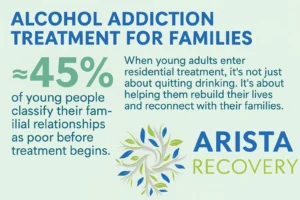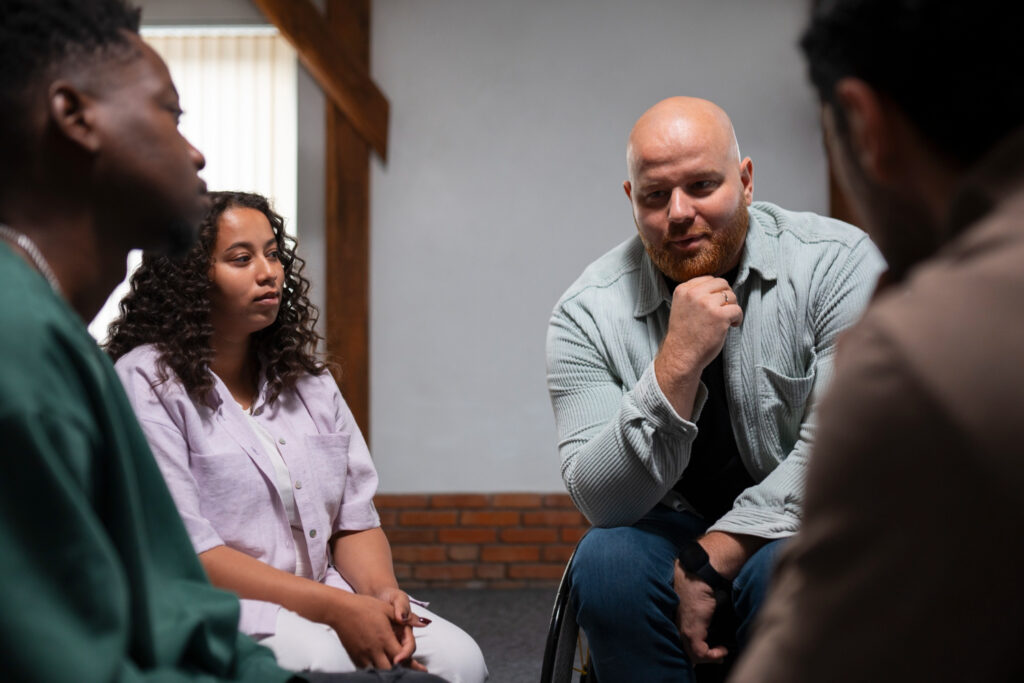When your child is caught in the grip of alcohol use, it can feel like watching a storm swallow the person you love. Grades fall. Trust shatters. Conversations turn into arguments or silence. As a parent, you’re left wondering if things will ever feel “normal” again.
The truth is, alcohol addiction touches more than one life—it ripples through entire families. But there is hope. With alcohol addiction treatment, young adults can begin to heal, and parents can find the relief of knowing that recovery is possible. Treatment isn’t just about stopping drinking—it’s about restoring lives and rebuilding relationships that alcohol has strained.
Why Alcohol Addiction Affects Families So Deeply
Alcohol doesn’t just numb the person drinking—it isolates them from the people who care most. Parents often describe feeling like they’re losing their child twice: once to the addiction itself, and again to the distance it creates in their relationship.
- Arguments replace connection. Instead of conversations, there are fights about drinking, school, or disappearing for nights at a time.
- Trust erodes. When promises are broken repeatedly, even small things—like your child saying they’ll be home at a certain time—feel impossible to believe.
- Fear becomes the daily norm. Parents live on edge, waiting for the next phone call, the next crisis, or the next slammed door.
Alcohol doesn’t just wound the individual—it reshapes the whole family system. That’s why treatment has to go deeper than just stopping the drinking.
How Alcohol Addiction Treatment Restores Stability
One of the first goals of treatment is stability—physically, emotionally, and mentally.
- Detox support when needed: Medical oversight ensures withdrawal is safe, reducing risks that often keep families awake at night.
- Structure and daily rhythm: Consistent sleep, meals, and routines help reset the body and mind.
- Therapeutic support: Depression, anxiety, or trauma that fuel drinking are addressed, not ignored.
When stability begins to return—even in small ways—families often feel like they can breathe again. Parents sometimes describe the first phone call where their child sounds clear and calm as the moment hope returns.
The Role of Therapy in Rebuilding Trust
Therapy is the backbone of alcohol addiction treatment. For young adults, it’s a chance to explore why alcohol became their escape in the first place. For families, it’s a way to repair the cracks alcohol left behind.
In individual therapy, your child can process shame, fear, or pain without judgment.
In family therapy, you can:
- Share what the addiction has felt like for you.
- Learn new ways to communicate that don’t spiral into blame.
- Begin to rebuild trust with small, realistic steps.
Trust doesn’t snap back overnight—it’s rebuilt brick by brick. Therapy gives families the tools to lay those bricks together.

How Treatment Helps Young Adults Reconnect with Life
Alcohol often robs young adults of direction. School feels impossible. Friendships fade. Joy disappears.
Treatment helps them rediscover what life can feel like without alcohol as the anchor:
- Coping skills: Learning healthier ways to handle stress and emotions.
- Peer support: Meeting others who “get it” helps reduce the loneliness of recovery.
- Rebuilding identity: Treatment encourages young adults to reconnect with interests, hobbies, and goals that alcohol once pushed aside.
Parents often notice a shift—small at first. Their child begins smiling again, or talking about the future. Those little signs of life coming back are often the most powerful.
Signs Families Might Notice Before Treatment
Parents often sense something is wrong before their child admits it. Common signs of alcohol addiction include:
- Behavior changes: Mood swings, irritability, or sudden secrecy.
- School or work decline: Missed assignments, slipping grades, or lost jobs.
- Social withdrawal: Avoiding family dinners or giving up hobbies once loved.
- Physical signs: Red eyes, changes in sleep patterns, or unexplained injuries.
- Excuses and denial: Frequent “just one drink” explanations that don’t match reality.
Not every sign points to addiction—but when patterns pile up, it’s often time to consider alcohol addiction treatment.
The Hope That Comes with Family Healing
Parents often ask: Will I ever get my child back?
While treatment can’t erase the past, it creates space for new beginnings. Families who once felt shattered often find themselves laughing together again. Trust grows back—slowly but surely. And most importantly, hope returns—not just for the young adult in recovery, but for the entire family.
Think of it like tending a garden after a storm. The damage is real, but with care, the roots can strengthen, and new growth can begin.
Why Choosing Local Support in Hilliard Matters
Treatment works best when it feels accessible and connected to daily life. Choosing alcohol addiction treatment in Hilliard, Ohio offers:
- Family involvement: Staying engaged in therapy sessions and progress check-ins.
- Smoother aftercare: Transitioning into outpatient support or ongoing therapy nearby.
- Community connection: Recovery grounded in the same environment your child will return to.
At Evoke Wellness Ohio, we believe healing is stronger when families stay connected through every stage of treatment.
FAQs About Alcohol Addiction Treatment for Families
Does alcohol addiction treatment include family therapy?
Yes. Most programs offer family sessions so parents and loved ones can be part of the healing process.
What if my child doesn’t believe they have a problem?
This is very common. Treatment teams are skilled at meeting resistance with compassion, helping young adults engage without shame or pressure.
How long does treatment last?
It depends on each individual. Many benefit from 30–90 days of care, with ongoing outpatient support afterward.
Is alcohol addiction treatment just about stopping drinking?
No. It also addresses underlying mental health struggles, builds coping skills, and focuses on repairing relationships.
Can families really heal after so much damage?
Yes. While trust takes time to rebuild, many families find themselves stronger and more connected after going through treatment together.
What role do parents play during treatment?
Parents often attend family therapy, participate in educational sessions, and learn new ways to support recovery without enabling destructive behavior.
What happens after treatment ends?
Aftercare is critical. Continued counseling, support groups, or outpatient care help young adults stay steady while families maintain support.
The Bottom Line
Alcohol addiction may have disrupted your child’s life and shaken your family, but it doesn’t have to define your future. With the right support, young adults can rebuild their lives—and families can rediscover connection, trust, and hope.
Recovery isn’t about erasing the storm. It’s about learning how to rebuild together once the skies start to clear.
Ready to explore your options? Call (866)430-9267 or visit alcohol addiction treatment in Hilliard, Ohio to learn more about compassionate, flexible support at Evoke Wellness Ohio.



